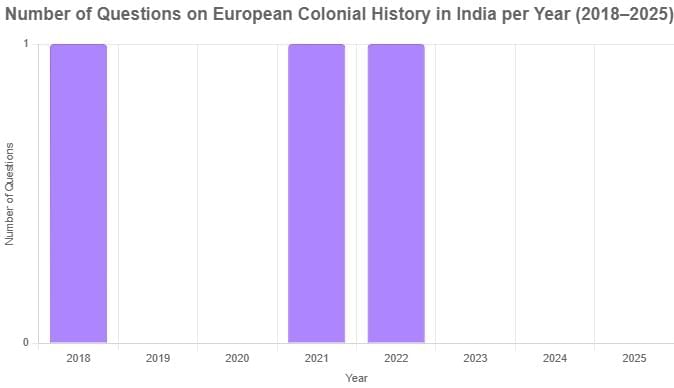From 2018 to 2025, 4 questions were asked on European colonial history in India, mostly focused on trade and settlements (71%), with a few on laws. The difficulty was mostly medium (57%), followed by easy (29%) and hard (14%). No questions came from 2023 and 2024.
UPSC Previous Year Questions (Prelims): The Advent of Europeans in India | History for UPSC CSE PDF Download

Note: No questions has been asked from this topic in the year 2024 and 2023
Q.1. Consider the following fruits: (2025)
I. Papaya
II. Pineapple
III. Guava
How many of the above were introduced in India by the Portuguese in the sixteenth and seventeenth centuries?
(a) Only one
(b) Only two
(c) All the three
(d) None
 View Answer
View Answer 
Correct Answer is Option (c)
Papaya, pineapple, and guava, originally from the Americas, were introduced to India by Portuguese explorers during European colonial expansion. Papaya and guava, native to Central America, arrived in the 16th and 17th centuries, respectively, while pineapple, from South America, was also brought by the Portuguese.
Q.2. With reference to Indian history, consider the following statements: (2022)
1. The Dutch established their factories/warehouses on the east coast on lands granted to them by Gajapati rulers.
2. Alfonso de Albuquerque captured Goa from the Bijapur Sultanate.
3. The English East India Company established a factory at Madras on a plot of land leased from a representative of the Vijayanagara empire.
Which of the statements given above are correct?
(a) 1 and 2 only
(b) 2 and 3 only
(c) 1 and 3 only
(d) 1, 2 and 3
 View Answer
View Answer 
Correct Answer is Option (b) 2 and 3 only
Statemnt 1: The Dutch established their factories/warehouses on the east coast on lands granted to them by Gajapati rulers: This statement is incorrect. The Dutch East India Company set up trading posts primarily in Southeast India and Kerala, but not specifically on lands granted by the Gajapati rulers. They operated in regions like Masulipatnam (on the east coast), but the Gajapati rulers of Odisha did not grant them land.
Statemnt 2: Alfonso de Albuquerque captured Goa from the Bijapur Sultanate: This statement is correct. Alfonso de Albuquerque indeed captured Goa in 1510 from the Bijapur Sultanate. Goa remained under Portuguese control thereafter, becoming the centerpiece of Portuguese India.
Statement 3: The English East India Company established a factory at Madras on a plot of land leased from a representative of the Vijayanagara empire:
This statement is correct. The English East India Company established its first settlement at Madras (Chennai) in 1639. The company received the land from the Nayak of Chandragiri, a representative of the Vijayanagara Empire.
Q.3. In the first quarter of seventeenth century, in which of the following was/were the factory/factories of the English East India Company located? (2021)
- Broach
- Chicacole
- Trichinopoly
Select the correct answer using the codes given below
(a) 1 Only
(b) 1 and 2
(c) 3 Only
(d) 2 and 3
 View Answer
View Answer 
The Correct Answer is Option (a)
- 1st Quarter of 17th Century- refers to the period between 1601 to 1625. During this the East India Company had base in Surat, Bharuch (Broach), Ahmedabad etc. → #1 is right.
- Trichonopolly – Trichy came under the British Influence in the later part of 17th Century. It was under the control of the Carnatic State , came to prominence in the second Carnatic war – 1749 to 1754- can be easily eliminated. → #2: wrong.
- Chicacole- part of Northern Circars – known for textile centre. It was taken by British from the Nizam of Hyderabad in 1766, during the first Anglo Mysore war. → #3 is wrong.
Note: No questions has been asked from this topic in the year 2020 and 2019.
Q.4. Which one of the following foreign travelers elaborately discussed diamonds and diamond mines of India? (2018-I)
(a) Francois Bernier
(b) Jean-Baptiste Tavernier
(c) Jean de Thevenot
(d) Abbe Barthelemy Carre
 View Answer
View Answer 
The Correct Answer is Option (b)
- Jean-Baptiste Tavernier: was a French traveler who visited India between 1640 and 1667. Being a diamond merchant, he was particularly interested in diamonds and visited various diamond mines in India, especially those of the Deccan.
- Jean De Thevenot (1626): one of the first French travelers, graphically describes the cultivation of indigo and the extent of its cultivation in his book Remonstrantie.
- Frenchman, Francois Bernier (1656- 58). His book Travels in the Mughal Empire mentioned the life of the peasantry, their poor conditions, towns, industries, life in the countryside and the urban culture, and, above all, the major manufactures of Indi(a)
- Abbe Carre also a Frenchman, visited Mughal India between 1672 and 1674 and recorded his information in The travels of Abbe Carre in India and the Near East. He wrote about the port towns and the role of the newly formed French East India Company.
|
110 videos|653 docs|168 tests
|
FAQs on UPSC Previous Year Questions (Prelims): The Advent of Europeans in India - History for UPSC CSE
| 1. What were the main motives behind the arrival of Europeans in India during the 15th and 16th centuries? |  |
| 2. Which European powers were involved in the exploration and colonization of India? |  |
| 3. What was the significance of Vasco da Gama's voyage to India? |  |
| 4. How did the British East India Company change the dynamics of trade in India? |  |
| 5. What were the impacts of European colonization on Indian society and economy? |  |






















